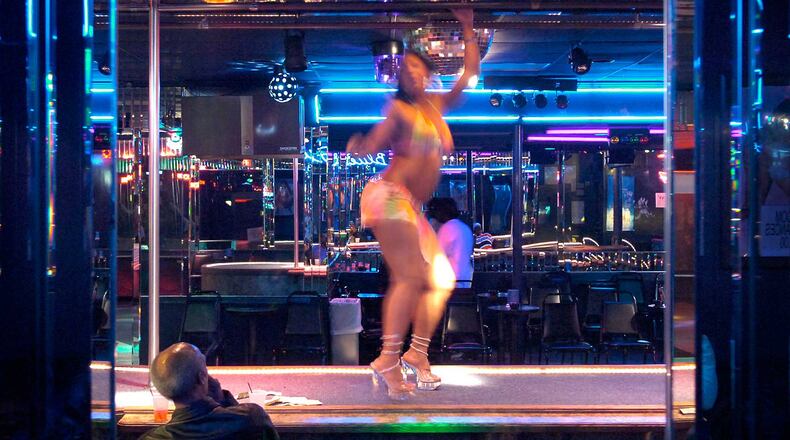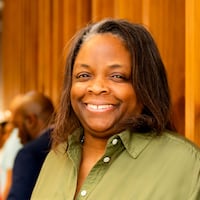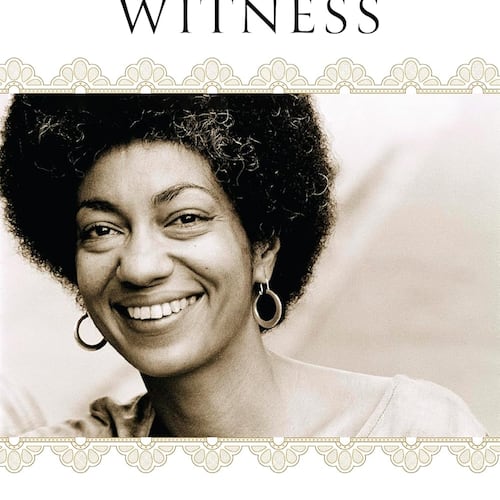Editor’s note: This article first published on Sept. 28, 2004. It was part of a series to celebrate hip-hop and the 25th anniversary of Sugarhill Gang’s “Rapper’s Delight,” the first rap single to crack the Top 40.
Bent over touching her toes — so that the crowd at Strokers can get a better view of what her thong is already doing a poor job of concealing — the last thing on White Chocolate’s mind is whether she’s taking the image of women down a notch with each suggestive drop to the floor.
More likely the Fayetteville resident is thinking about the dry cleaning she forgot to pick up. Or whether she’s going to hit the Waffle House after work. Or something equally mundane.
And when hip-hop superstar Nelly swiped a credit card down her behind during an outdoor shoot for “Tip Drill,” in what became one of the most infamous music video scenes ever?
Same kind of everyday thoughts:
“Boy it’s hot out here!”
Or “I can’t wait to get my check!”
“I’m not representing anybody but myself,” says White Chocolate, an occasional stripper, aspiring rapper and owner of a local graphics and Web design company who declined to give her real name. “No one is exploiting me. No one is making me do anything I don’t want to do. . . . I’ve been in about 27 music videos doing my thing. I’ve got a five-bedroom house on a half-acre of land. Drive a Jag. If anything, hip-hop has been very, very good to this woman right here.” Now that’s a testimonial you don’t hear often.
If there has been one ongoing criticism of hip-hop in its quarter-century of existence, it is of the way it treats its women. Women in hip-hop songs and videos often aren’t “women,” they’re whores — or worse — who exist only to provide sexual pleasure. Such vulgar portrayals have offended everyone from famed rap opponent C. Delores Tucker to hip-hop’s multimedia star Queen Latifah to, most recently, a vocal segment of the Spelman College student body who were specifically outraged by the “Tip Drill” video.
But like White Chocolate, a lot of women in the business say they aren’t bothered by this. In fact, these days, a considerable number are using the same lewd terms to describe women and sex.
And it’s making them successful.
“Ben-da, bend that thang over. Yeaaahhh! Ben-da, bend that thang over,” goes the chorus of the current hip-hop single “Vibrate.”
Funny thing is, the singer is diminutive Gwinnett County rapper and mother Rasheeda. For the past 11 years she has been trying to make it in the music business, first as a member of the short-lived group Da Kaperz, then as a solo artist with one regionally popular single (“Do It,” with Pastor Troy) and two poorly received albums.
Then one fateful night she went to a party in downtown Atlanta where a lot of strippers were performing. From that party sprang “Vibrate.” Now she has a singles deal on the same label as R&B giant Usher and contemporary pop icon Britney Spears.
“If I would have known all I had to say was, ‘Bend that thang over . . . and I could get this kind of response, I would have done it a long time ago,” she laughs.
She’s only half joking.
Rasheeda has no misgivings about “Vibrate,” or her bold musical style. She even takes her 3-year-old son, Ky, to some of her shows.
“The lyrical content may be a little much,” she says. “But it’s not any different than anything else he’s heard. And sometimes he’ll say, ‘Mama you said that,’ and I’ll [reply], ‘but you better not say it!’
“When it comes to me and my family and my music, I’m real. And what better way to talk about real women things than from a woman? When I’m at shows, the women are like, ‘Hey, she’s snapping! She’s really hot!’ Or ‘Damn, about time somebody did it like that!’ "
Newcomer Jacki-O certainly doesn’t blame Rasheeda for getting racy.
“A female coming along in this male-dominated industry has to do something that’s powerful, that gets a response,” she says. The first single from her upcoming CD “Poe Little Rich Girl” --- at least the PG-rated title of it --- is “Nookie.”
The chorus: “Noo-kie reeaall good. Noo-kie reeall good.”
Over and over again.
“Some people have said to me, ‘Oh you used sex to stake your claim’ ... yes I did!” she says. “Sex sells, and everybody knows that.”
Power and politics
Lyrics like these are a long way from the days when Latifah confidently put “Ladies First,” or when MC Lyte confronted drug abuse in “I Cram to Understand You (Sam)” or even when Lauryn Hill warned women in “Doo Wop” to watch out for men only after sex.
“We weren’t total innocents,” says Cheryl “Salt” James, who’s moved from the pioneering female rap group Salt-N-Pepa to a solo gospel act. “I mean, [in] ‘Shoop’ we were like ‘How does it hang?’ and of course there was ‘Push It.’
“But compared to what these women are saying now we were nuns!”
James says that when she’s taking her teenage daughter to school, she’s policing the radio like a chaperone at the prom.
“I turn into a lunatic sometimes,” James says. “I can’t believe hip-hop has gone this far. Men pouring champagne over women’s heads in videos. Women allowing it. Women saying absolutely filthy things.”
And why aren’t more women rappers as upset about it as she is?
“Now that’s something I’m not surprised about. Hip-hop has gone this far because hip-hop can. Or shall I say, hip-hop is allowed to. It’s that powerful. [Hip-hop godfather] Russell Simmons is powerful. P. Diddy? Powerful. People treat them like gods or something. . . . And no one wants to speak against these powerful forces for fear that they may be shut up. Shut down. Or shut out.”
In entertainment circles, Oscar-nominee, Grammy-winner and movie producer Latifah wields quite a bit of influence. And she has mixed feelings about where hip-hop and women are now, some 15 years after she made her rap debut.
The “senior citizen of the game,” as Latifah calls herself, said she understands how the lyrical content has reached the level that Rasheeda and Jacki-O — and Lil Kim and Foxy Brown before them — have taken it.
“It’s very difficult not to be indoctrinated in a way,” says Latifah, who some may recall recording a defiant song called “U.N.I.T.Y.” that began, “Who you calling a b---?”
“There are very few female rappers not surrounded by a camp full of men or male producers or male executives. There are very few female rappers who have females around them, and when you’ve got to play in this boy’s world, constantly, it’s hard not to pick up traits.” Latifah also can’t help but be disappointed that all these years after her debut, “All Hail the Queen,” female rappers still are few and far between.
This week, for example, Shawnna is the only female rapper with a Top 25 single on the Billboard Rap Tracks chart. (Though Remy Martin is a part of the Terror Squad, which has the No. 1 single “Lean Back.”)
Latifah says she’s also discouraged by another bad habit female rappers seem to have picked up from their male counterparts: trashing each other in song.
That’s something that bothers Atlanta rapper Da Brat, too. “We should all be able to get along . . . tearing each other down on record is crazy to me. There’s enough money out there for all of us. Why waste time battling each other when we can all be getting paid?”
Placing blame
Tricia Rose, the author of “Longing to Tell: Black Women Talk About Sexuality and Intimacy,” says the focus may be shifting from how men are treating women in hip-hop to how they’re portraying themselves, but, “In the end, the images out there are still pretty bad. People are not dealing with that problem; they’re just shifting the blame as to who’s responsible.”
Back on whose shoulders it belongs, says Shawnna, the only female artist on rapper Ludacris’ Disturbing Tha Peace label.
“I’m in control of what I say and do,” says the Chicago-based artist who, after guest appearances on Ludacris’ “What’s Your Fantasy” and “Stand Up,” picks up the X-rated ball and runs with it on her Top 25 single “Shake That [Expletive],” from her “Worth tha Weight” solo debut, in stores today.
“And these men don’t hold a gun to these women’s heads and say, ‘Take off all your clothes basically, and dance this way [in videos].’ They get in these long lines at the model calls dressed that way.”
Indeed, Kai Toi, the statuesque attraction in OutKast’s “The Way You Move” video, did show up on the set with the bathing suit she wears in the video — underneath her jumpsuit.
The part-time Atlantan says the only problem she had with dancing in a one-piece and heels was that she doesn’t really like the way she moves.
“I do not know how to dance, but I’m very proud of my body,” says Toi, the CFO of Destiny’s Child, a local program for rehabilitating the mentally challenged and disabled. “I work out three days a week and on Saturdays I walk five miles. . . . I’m glad I was able to represent for OutKast — especially since [Antwan] Big Boi [Patton] is family. And the ATL. As well as women.”
Videos, Toi says, have been a steppingstone for herself and many others. Her appearance in the OutKast video relit her acting career, she says. She has a part in the upcoming Latifah movie “Beauty Shop” as well as a sitcom pilot with rapper Trina and a martial arts film in the can.
Videos, adds Source magazine Editor-in-Chief Kim Osorio, are just one part of the hip-hop industry. One of the more visible parts, she concedes, but still just one part.
‘Lot more control’
Osorio, mother of a 3-year-old daughter, says she tries “very hard not be bothered by some of the images” in videos, and yes, even on the cover of the publication she runs. “I view them on an individual, case-by-case basis. Certain artists know what image they need to utilize to get more attention. You have other female artists who are dead serious when they say that [being hypersexual] is making them more powerful. . . . I just really try to be neutral for the benefit of the magazine and the business.
“Besides, women have a lot more control these days than people think, or see,” she says. “There are enough women in the game right now that dictate a lot of the stuff that’s going on. On the record label side, in the media, even as video directors.
“The other thing people have to keep in mind,” Osorio says, “is that the video and the music are entertainment.”
In real life, White Chocolate notes, “people don’t go around swiping women’s butts,” as Nelly did to her in his “Tip Drill” video.
In real life, however, the Tip Drill Live tour — in which a clothed White Chocolate serves as party hostess — could be coming to a sports bar or nightclub near you.
Yet another way she’s making the most out of the, ahem, exposure hip-hop has given her.
About the Author
Keep Reading
The Latest
Featured




